小学英语疑问句
小学英语必须掌握的8个特殊疑问句(附例句)

小学英语必须掌握的8个特殊疑问句(附例句)1、由who/whom/whose 引导的注释:who的意思是“谁”,询问人(做主语);whom的意思是“谁”,询问人(作宾语);whose的意思是“谁的”,询问物体的所属。
◆Who are you? 你是谁?I am Cara. 我是卡拉。
◆Whose book is this? 这本书是谁的?It’s mine. 它是我的。
2、由which 引导的注释:which即“哪一,哪一个”,问一定范围内特指的人或物。
◆Which box is yours? 哪个盒子是你的?The blue one. 蓝色的那个。
◆Which book do you like best? 你最喜欢哪本书?The Little Prince.《小王子》。
◆Which country do you come from? 你来自哪个国家?China. 中国。
3、由when 引导的注:when即“什么时候/何时”,询问时间。
◆When shall we meet? 我们什么时候见面?Tomorrow 明天。
◆When is her birthday? 她什么时候生日?May 1 is her birthday. 五月一号是她的生日。
◆When do you get up every day? 你每天什么时候起床?At 6:00 a.m. 早上六点。
4、由where 引导的注:where即“哪里,在哪里”,询问地点。
◆Where will you spend the summer holiday? 你会去哪里过暑假?I'm going to Hawaii. 我要去夏威夷。
◆Where is your coat? 你的外套在哪啊?It’s on the sofa. 在沙发上。
5、由why 引导的注:why即“为什么”,询问原因,回答从句一般由because引导。
◆Why isn’t he at school today? 他今天为什么不在学校?Because he is ill. 因为他生病了。
小学英语疑问句型汇总大全
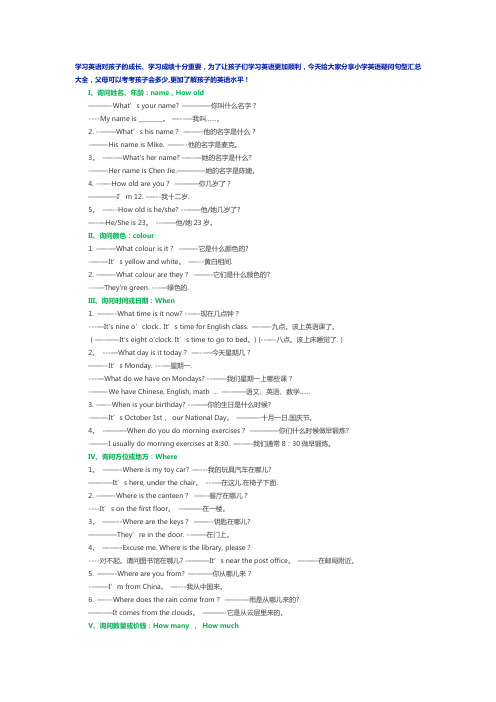
学习英语对孩子的成长、学习成绩十分重要,为了让孩子们学习英语更加顺利,今天给大家分享小学英语疑问句型汇总大全,父母可以考考孩子会多少,更加了解孩子的英语水平!I、询问姓名、年龄:name,How old———-What’s your name? ————你叫什么名字?----My name is ________。
—--—我叫……。
2. --——What’s his name?—-—-他的名字是什么?-——-His name is Mike. ——--他的名字是麦克。
3。
-—-—What's her name? -—-—她的名字是什么?-——-Her name is Chen Jie.————她的名字是陈婕。
4. --—-How old are you?-———你几岁了?————I’m 12. -—--我十二岁.5。
-—--How old is he/she? --——他/她几岁了?—-—He/She is 23。
--——他/她23岁。
II、询问颜色:colour1. -—-—What colour is it?-——-它是什么颜色的?-—-—It’s yellow and white。
—---黄白相间.2. -——-What colour are they?-——-它们是什么颜色的?---—They're green. ---—绿色的.III、询问时间或日期:When1. ——--What time is it now? --—-现在几点钟?---—It's nine o’clock.. It’s time for English class. —-—-九点。
该上英语课了。
(—-——It's eight o'clock. It’s time to go to bed。
) (--—-八点。
该上床睡觉了.)2。
---—What day is it today?—--—今天星期几?——--It’s Monday. ---—星期一.---—What do we have on Mondays? --——我们星期一上哪些课?-——-We have Chinese, English, math …—-——语文、英语、数学……3. -—--When is your birthday? --——你的生日是什么时候?-—-—It’s October 1st,our National Day。
全讲全练100例:小学英语疑问句全解析
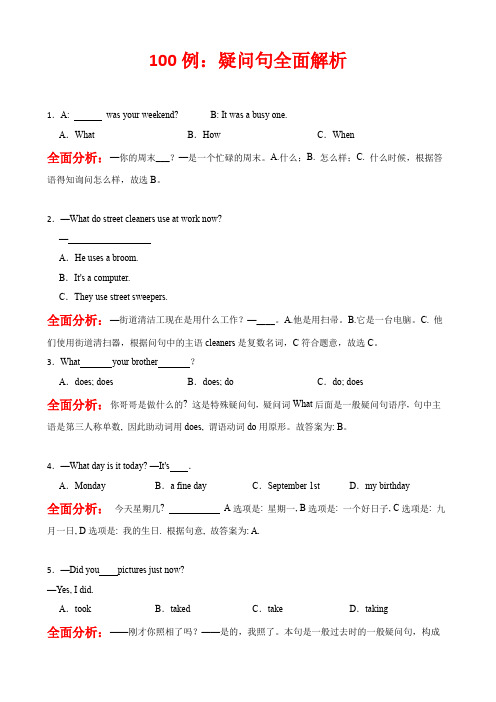
100例:疑问句全面解析1.A: was your weekend? B: It was a busy one.A.What B.How C.When全面分析:—你的周末___?—是一个忙碌的周末。
A.什么;B. 怎么样;C. 什么时候,根据答语得知询问怎么样,故选B。
2.—What do street cleaners use at work now?—A.He uses a broom.B.It's a computer.C.They use street sweepers.全面分析:—街道清洁工现在是用什么工作?—____。
A.他是用扫帚。
B.它是一台电脑。
C. 他们使用街道清扫器,根据问句中的主语cleaners是复数名词,C符合题意,故选C。
3.What your brother ?A.does; does B.does; do C.do; does全面分析:你哥哥是做什么的? 这是特殊疑问句, 疑问词What后面是一般疑问句语序, 句中主语是第三人称单数, 因此助动词用does, 谓语动词do用原形。
故答案为: B。
4.—What day is it today? —It's .A.Monday B.a fine day C.September 1st D.my birthday全面分析:今天星期几? A选项是: 星期一, B选项是: 一个好日子, C选项是: 九月一日, D选项是: 我的生日. 根据句意, 故答案为: A.5.—Did you pictures just now?—Yes, I did.A.took B.taked C.take D.taking全面分析:——刚才你照相了吗?——是的,我照了。
本句是一般过去时的一般疑问句,构成Did+主语+动词原形+其它?故选C.6.—_________ will you finish your English class?—Next term.A.Where B.What C.When全面分析:——你什么时候能学完你的英语课?——下学期。
小学英语重点疑问句归纳
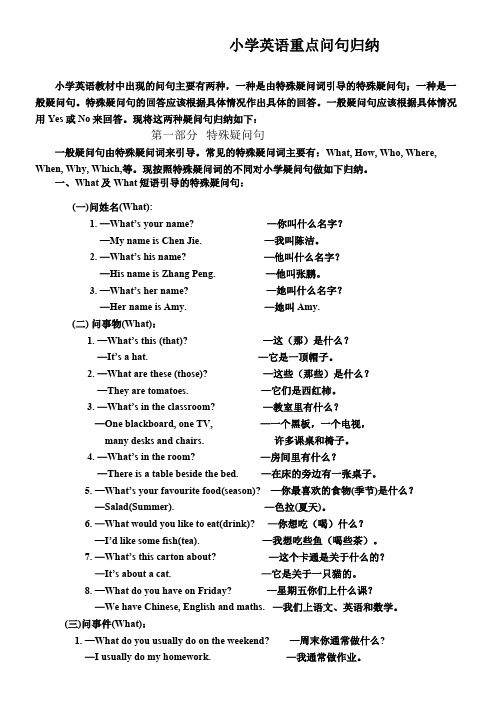
小学英语重点问句归纳小学英语教材中出现的问句主要有两种,一种是由特殊疑问词引导的特殊疑问句;一种是一般疑问句。
特殊疑问句的回答应该根据具体情况作出具体的回答。
一般疑问句应该根据具体情况用Yes或No来回答。
现将这两种疑问句归纳如下:第一部分特殊疑问句一般疑问句由特殊疑问词来引导。
常见的特殊疑问词主要有:What, How, Who, Where,When, Why, Which,等。
现按照特殊疑问词的不同对小学疑问句做如下归纳。
一、What及What短语引导的特殊疑问句:(一)问姓名(What):1. —What’s your name? —你叫什么名字?—My name is Chen Jie. —我叫陈洁。
2. —What’s his name? —他叫什么名字?—His name is Zhang Peng. —他叫张鹏。
3. —What’s her name? —她叫什么名字?—Her name is Amy. —她叫Amy.(二) 问事物(What):1. —What’s this (that)? —这(那)是什么?—It’s a hat. —它是一顶帽子。
2. —What are these (those)? —这些(那些)是什么?—They are tomatoes. —它们是西红柿。
3. —What’s in the classroom? —教室里有什么?—One blackboard, one TV, —一个黑板,一个电视,many desks and chairs. 许多课桌和椅子。
4. —What’s in the room? —房间里有什么?—There is a table beside the bed. —在床的旁边有一张桌子。
5. —What’s your favourite food(season)? —你最喜欢的食物(季节)是什么?—Salad(Summer). —色拉(夏天)。
小学英语语法-疑问句
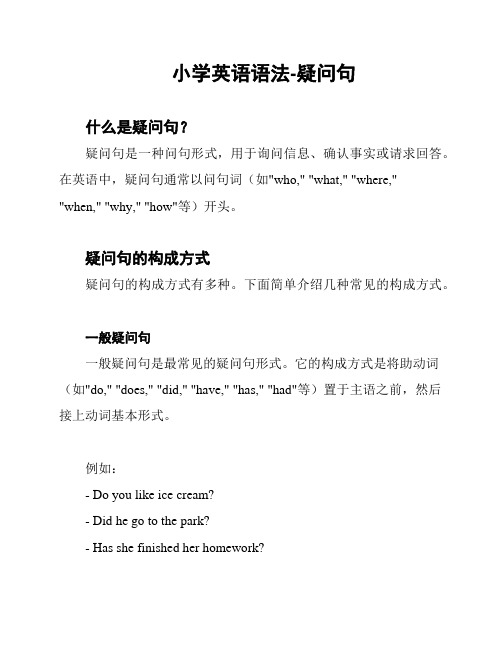
小学英语语法-疑问句什么是疑问句?疑问句是一种问句形式,用于询问信息、确认事实或请求回答。
在英语中,疑问句通常以问句词(如"who," "what," "where," "when," "why," "how"等)开头。
疑问句的构成方式疑问句的构成方式有多种。
下面简单介绍几种常见的构成方式。
一般疑问句一般疑问句是最常见的疑问句形式。
它的构成方式是将助动词(如"do," "does," "did," "have," "has," "had"等)置于主语之前,然后接上动词基本形式。
例如:- Do you like ice cream?- Did he go to the park?- Has she finished her homework?特殊疑问句特殊疑问句用于询问特定信息。
它的构成方式是将特殊疑问词(如"who," "what," "where," "when," "why," "how"等)置于句首,然后继续构成一般疑问句的方式。
例如:- What is your name?- Where do you live?- How did you get here?选择疑问句选择疑问句用于在几个选项中进行选择。
它的构成方式是将选择状语(如"or," "either"等)置于句首,然后继续构成一般疑问句的方式。
例如:- Do you want coffee or tea?疑问句的回答方式疑问句的回答方式通常有以下几种。
小学英语必须掌握的八个特殊疑问句(附例句)
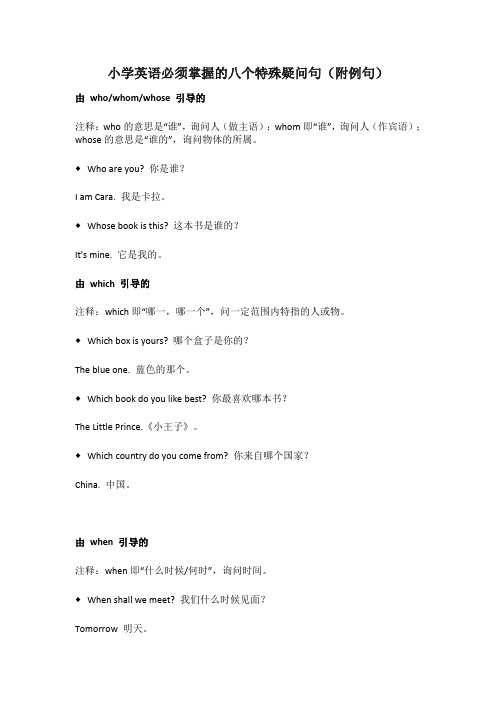
小学英语必须掌握的八个特殊疑问句(附例句)由who/whom/whose 引导的注释:who的意思是“谁”,询问人(做主语);whom即“谁”,询问人(作宾语);whose的意思是“谁的”,询问物体的所属。
◆ Who are you? 你是谁?I am Cara. 我是卡拉。
◆ Whose book is this? 这本书是谁的?It's mine. 它是我的。
由which 引导的注释:which即“哪一,哪一个”,问一定范围内特指的人或物。
◆ Which box is yours? 哪个盒子是你的?The blue one. 蓝色的那个。
◆ Which book do you like best? 你最喜欢哪本书?The Little Prince.《小王子》。
◆ Which country do you come from? 你来自哪个国家?China. 中国。
由when 引导的注释:when即“什么时候/何时”,询问时间。
◆ When shall we meet? 我们什么时候见面?Tomorrow 明天。
◆ When is her birthday? 她什么时候生日?May 1st is her birthday. 五月一号是她的生日。
◆ When do you get up every day? 你每天什么时候起床?At 6:00 a.m. 早上六点。
由where 引导的注释:where即“哪里,在哪里”,询问地点。
◆ Where will you spend the summer holiday? 你会去哪里过暑假?I m going to Hawaii. 我要去夏威夷。
◆ Where is your coat? 你的外套在哪啊?It's on the sofa. 在沙发上。
由why 引导的注释:why即“为什么”,询问原因,回答从句一般由because引导。
◆ Why isn't he at school today? 他今天为什么不在学校?Because he is ill. 因为他生病了。
小学英语重点疑问句归纳

小学英语重点问句归纳小学英语教材中出现的问句主要有两种,一种是由特殊疑问词引导的特殊疑问句;一种是一般疑问句。
特殊疑问句的回答应该根据具体情况作出具体的回答。
一般疑问句应该根据具体情况用Yes或No来回答.现将这两种疑问句归纳如下:第一部分特殊疑问句一般疑问句由特殊疑问词来引导。
常见的特殊疑问词主要有:What, How, Who,Where, When, Why, Which,等。
现按照特殊疑问词的不同对小学疑问句做如下归纳。
一、What及What短语引导的特殊疑问句:(一)问姓名(What):1. -What’s your name? -你叫什么名字?—My name is Chen Jie。
—我叫陈洁。
2. —What's his name?—他叫什么名字?-His name is Zhang Peng. —他叫张鹏。
3. —What’s her name? -她叫什么名字?—Her name is Amy. —她叫Amy.(二) 问事物(What):1. —What’s this (that)? -这(那)是什么?—It’s a hat。
-它是一顶帽子。
2。
-What are these (those)? -这些(那些)是什么?-They are tomatoes. —它们是西红柿。
3。
—What's in the classroom?—教室里有什么?—One blackboard, one TV,—一个黑板,一个电视, many desks and chairs。
许多课桌和椅子。
4. —What’s in the room?—房间里有什么?-There is a table beside the bed. —在床的旁边有一张桌子。
5。
—What’s your favourite food(season)? -你最喜欢的食物(季节)是什么?—Salad(Summer). —色拉(夏天)。
小学英语一般疑问句和特殊疑问句

Whose book is this?(单数)
It’s Ann’s.
表示“谁的”
Whose books are these?(复数)
They’re Ann’s.
How much
How much is the book?
It’s ten yuan.
表示“多少钱”
How many
How many books are there?
There are five.
表示“多少数量”
总结:①单数用is复数用are,单数问题单数答,复数问题复数答;
②whose表示“谁的”,回答要有“的”,How much回答有“yuan”
③看到“Is ......或者Are......”开头的问句,回答要有Yes或No。
No, I can’t.
特殊疑问句:对句中的某一成分提问,不用yes和no来回答
疑问词
问
答
用法
what
at is this?(单数)
It’s a ruler.
表示“什么”
What are these?(复数)
They are rulers.
who
Who’s that?
That’s Ann.
表示“谁”
Yes, they are.
No, they aren’t.
Do开头
Do you like panda?
Yes, I do.
No, I don’t.
Does开头
Does he like cat?
Yes, he does.
No, he doesn’t.
Can开头
Can you jump?
Yes, I can.
- 1、下载文档前请自行甄别文档内容的完整性,平台不提供额外的编辑、内容补充、找答案等附加服务。
- 2、"仅部分预览"的文档,不可在线预览部分如存在完整性等问题,可反馈申请退款(可完整预览的文档不适用该条件!)。
- 3、如文档侵犯您的权益,请联系客服反馈,我们会尽快为您处理(人工客服工作时间:9:00-18:30)。
【要点精华】一.疑问句的定义:用来提出问题的句子就是疑问句。
二.疑问句的分类:分为一般疑问句,特殊疑问句,选择疑问句和反意疑问句。
这里反意疑问句不做讲解。
三.一般疑问句:1)一般疑问句的概念:就是对一件事情或一种情况是否属实提出疑问的句子。
2)一般疑问句通常以be, have, 助动词或情态动词开头,回答时用Yes或No来回答。
朗读时用升调。
例如:--Is the plane ten minutes late? --Yes, it is.--Do you go to school? --Yes, I do.--Are they singing? --No, they aren’t.--Did he go to Dalian? --Yes, he did.--Does she watch TV every day? --No, she doesn’t.3) 重点讲解把肯定句变成一般疑问句。
四.特殊疑问句:1)特殊疑问句的概念:特殊疑问句就是对句子中的某一部分提出疑问,并要求对方做出回答的句子。
常用疑问词what , who, whose, which, when, why, where, how等词引导后面跟一般疑问句。
读时句末用降调。
回答不能用Yes或No回答,需根据所提的问题做出具体的回答。
2)常见疑问词的用法。
①what用来询问事情“什么”。
例如:What are you doing?what color 用来问颜色“什么颜色”。
例如:What colour is it?what time 用来问时间“什么时候”。
例如:What time is it?② which用来问“哪一个”。
例如:Which is your watch, the yellow one or the white one?③who用来问人“谁”。
例如:Who’s the man with a big nose?④whose 用来问某物归谁所有“谁的”。
例如:Whose bag is it?⑤when用来问时间“什么时候”。
例如:When is your birthday?⑥where用来问地点“哪里”。
例如:Where is my ball pen?⑦why用来问原因“为什么”。
例如:Why do you like summer?⑧how用来问方式“怎样”。
例如:How do you go to school every day?How old问年龄“多大”。
例如:How old is the young man?How many问可数名词的数量“多少”。
例如:How many books are there in theschool bag?How much问不可数名词的数量“多少”。
例如:How much is the toy bear? 四.选择疑问句:选择疑问句的概念:就是提供两种或两种以上的情况,供对方选择回答的疑问句。
全句用or连接。
朗读时,or前的部分用升调,or后的部分用降调。
选择疑问句的回答不能用Yes或No,要根据实际情况直接回答。
例如:Is it blue or purple?Which color do you like, red, blue or yellow?【实战演练场】疑问句一.在下面的横线上填上恰当的疑问词。
1.______do you go to school? On foot.2.______grade are you in? I’m in Grade One.3.______cat is it? It’s Lucy’s.4.______is the car? It’s red.5.______is that old man? He is my grandma.6.______does the school begin? Two days later.7.______is the pork? Seventeen yuan.8.______are you late? Because my clock doesn’t work.9._______do you exercise? Once a week.10.______did they have a picnic? In the park.11.______is your mother? She is fine.12.______students are there in your class?13.______are you? I’m 164cm.14.______is older? John is older than Mike.15.______are your feet? I wear Size 18.二.将下列各句变为一般疑问句,并做肯定或否定回答。
1.There is an orange in my bag.______ ______an orange in ______bag? Yes,______ ______.2.They are playing basketball on the playground.______ ______ _____basketball on the playground? No,______ ______.3.They can borrow books from the library.______ ______borrow books from the library? Yes,______ ______.4.He has many English books.______ ______ ______ ______English books? No,______ ______.5. I would like a cup of milk, please._______ ______like a cup of milk, please? Yes,______.6. I want to come with you.______ ______want to come with______? Yes,______ ______.7. His father went to France last year.______his father______to France last year? No,______ ______.8. They go to school on foot every day.______ ______ ______ to school on foot every day? Yes,______ ______.三.对划线部分提问。
1.The Chinese car is red.______ ______ ___the Chinese car?2.There are four sheep on the hill.______ ______ ______ ______ ______on the hill?3.Lucy is doing her homework.______ ______ ______ ______?4.It is Sunday today._______ ______ _______ ______ ______?5.The story book is hers.______ ______the story book?6.His father is a doctor.______ ______ ______ ______?四.将下列各句变为选择疑问句。
1.He will be here at eight.(at nine)2.They are in the classroom .(on the playground)3.We’ll watch TV.(go to the cinema)4.This dictionary is his.(hers)5.She is a nurse.(doctor)6.You learn English.(Chinese)五.将下列打乱顺序的单词排列成通顺的疑问句。
1.can mom I to speak please your2.Lin Yun go her did where on holiday3.go did how you to Beijing4.football you did play morning this六.从方框中选择合适的选项补全对话。
A.How do you do that?B.What are you going to do this afternoon?C.See you.D.What should you do then?E.How are you?_1_I’m fine, thanks. And you?I’m fine. _2_I’m going to plant flower seeds in our garden._3_It’s easy. First, put the seeds in the soil._4_Water it. In several days, you can see the sprout.Great, so I will come to see your sprout._5_.1.______2.______3._______4.______5._______A.Where did you go?B.Did you have a good time?C.How did you go there?D.It was so happy.E.What did you do on your holiday?How was your holiday?_1_We took a long trip last summer holiday.Wow!_2_We went to Beijing._3_We went there by train. We read books on the train._4_We visited the Great wall, went shopping and bought many clothes.What else?We rowed a boat and took many beautiful pictures in Beijing park, and we ategood ,too.It’s so wonderful!_5_Of course. We had a good time in Beijing.七.根据实际情况回答问题。
